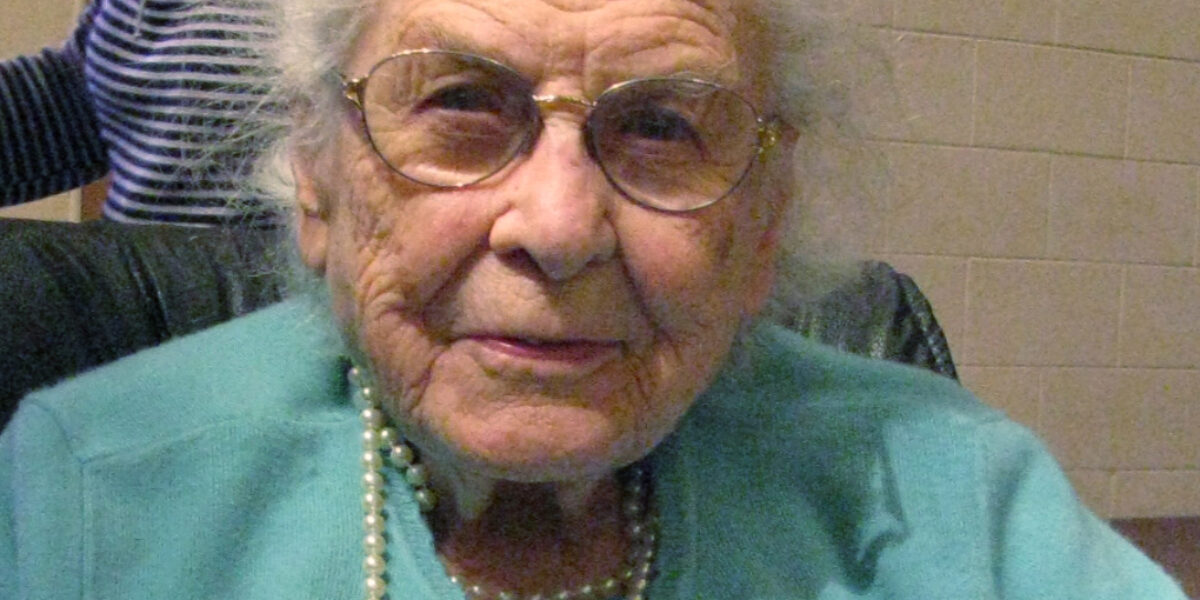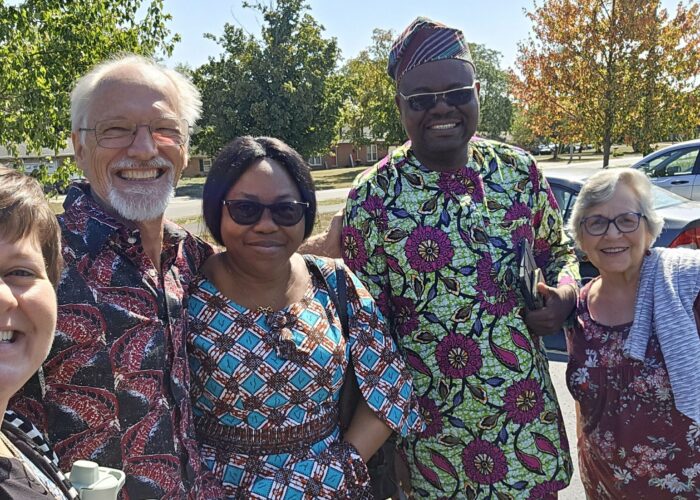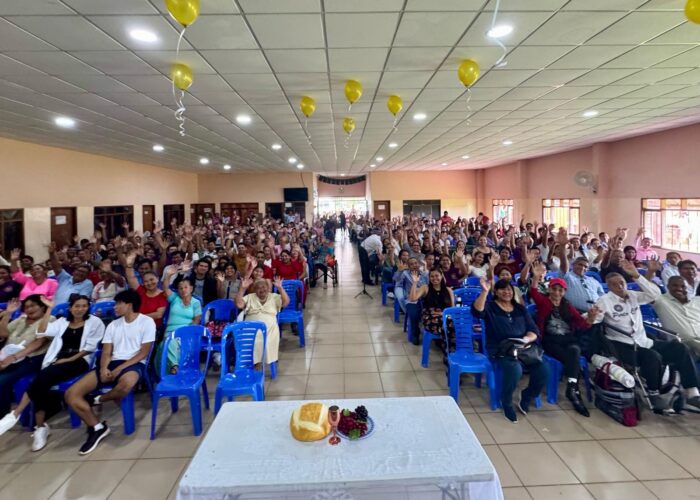ELKHART, Ind. (Mennonite Mission Network) – Over curry meals and cups of chai, Irene Lehman Weaver conversed with national heads of churches and lonely college students with equal attentiveness and respect. Although Weaver, 103, died Nov. 22 at Schowalter Villa in Hesston, Kan., her legacy lives on through her stories – written, recorded and practiced in the daily ministries of those who continue to “simply love people into God’s kingdom.”
After learning of Weaver’s “home-going,” Thomas Oduro, president of Good News Theological College and Seminary in Accra, Ghana, wrote: “I can imagine the saints of heaven giving her a rousing standing ovation. I am praying that the earthly ministries of the Weavers will encourage me to press on – no matter the challenges.”
Good News Theological College and Seminary is one of the fruits of Weaver’s ministry. She and her husband, Ed Weaver, emphasized the importance of a contextualized biblical education for church leaders. Through their careful listening and teaching, they laid the foundations for seminaries in many African countries.
In the course of Weaver’s lifetime, she experienced all the phases of Mennonite mission history. She was born to Lydia and Martin Clifford Lehman in Bilaspur, India, Jan. 23, 1910 – just 11 years after the Mennonites first sent missionaries to that country, the first overseas mission endeavor of North American Mennonites.
Although Irene and Ed Weaver spoke out strongly against mission administered exclusively by expatriates, Irene always tempered her commentary by saying, “I can’t ever criticize the way [the early missionaries] worked because if I had been there in that time, I would have done the same thing. But, this is a new day in mission.”
In 1928, Irene Lehman boarded a ship and crossed the Atlantic Ocean to attend Goshen (Ind.) College. There, she met her future husband, Ed. After graduation in 1932, she joined Ed at New York Biblical Seminary. They married year later and went to Chicago to serve a Spanish-speaking congregation through Mennonite Board of Missions and Charities, a predecessor agency of Mennonite Mission Network.
In 1935, the mission board asked the Weavers to go to India. One day, about 10 years into their work in India, Irene Weaver overheard an Indian woman say that living in a white person’s house must be like heaven.
“Those words burned shame into my soul,” Weaver said in a 2004 interview. “I began to question many things. I decided my strategy of work in a foreign country would be different from anything I had experienced before.”
The Weavers began to realize that Western mission had encumbered Mennonites in India with ungainly structures that hampered their capacity to be God’s people.
“It was like we had put Saul’s armor on David. The [Indian] church couldn’t move – not with our way of doing things, not with the trappings we had brought. When they finally shook off our trappings, when we were out of the way, then they could take charge of things. We could have saved the Indian church a lot of heartache,” Irene Weaver said.
 Download full-resolution image.
Download full-resolution image.In 1959, the mission agency asked the Weavers to respond to a request from 50 African-Initiated Churches in Nigeria who wanted to join the Mennonite denomination after hearing Mennonite Hour radio program broadcasts from Liberia. Upon arriving in Uyo, Nigeria, Ed and Irene counted 225 congregations from 40 different denominations in a five-mile radius around their new home. Rather than establishing the 41st denomination, they positioned themselves as learners, struggling to understand what a truly autonomous African church would look like. Not behaving as missionaries were expected to, they faced opposition from both foreign mission agencies and the African-Initiated Churches.
As the Weavers integrated into life in Uyo, they began to notice that many African Christians were eager for biblical education. They started classes that laid the groundwork for the birth of the Uyo United Independent Churches Bible College, the first of several biblical institutions that grew up throughout western and southern Africa as an outgrowth of their ministries.
By the time civil war erupted in 1967 with the Biafran secession from the 7-year-old nation of Nigeria, Mennonite Board of Missions and Charities had sent 54 workers to Nigeria to build on the Weavers’ ministry. Most of these mission workers were placed with other agencies to teach in their schools, staff their hospitals, and administer their development programs. Through this kind of collaboration, Mennonites worked at breaking down the hostility that poisoned the relationships between African-Initiated Churches and mission-planted agencies. This was one of the first examples of networking that has become the primary mode of Mennonite Mission Network ministry.
When the Biafran war forced expatriates to leave Nigeria, the Weavers began a two-year tour along the West African coastline studying the possibilities of working with other African-Initiated Churches. Mennonite Mission Network’s ministries in Liberia, Ivory Coast, Ghana, Togo and Benin grew out of these contacts.
The Weavers tried to retire from overseas ministry five times before finally succeeding and settling in Hesston, Kan. They were called out of retirement to help Mennonite workers in southern Africa and Latin America develop more collaborative mission strategies.
The teacher-learner approach was dear to Irene Weaver’s heart. She frequently repeated this refrain: “We do well to forget who we think we are and recognize our need to learn before trying to teach others. Jesus spoke so frequently about humility with reference to God’s kingdom.”
But loving people into God’s kingdom was what she called “the grand finale of my experience in mission. The older I get, the more I realize that the whole purpose of life is to love people into God’s kingdom, whether you are in India, Africa, or anywhere. That is my strategy of mission,” Weaver said.
Irene Weaver is survived by son, Jerry (Cathy), of Kansas; son-in-law, Vic Esch, of Colorado; 10 grandchildren, and 15 great-grandchildren. She was preceded in death by her parents; her sister, Carolyn Bender; her brother, Waldo Lehman; husband, Edwin; and daughters, Carolyn Esch and Betty Shima.
A service to celebrate Irene Weaver’s life will be held at 2 p.m. Saturday, Dec. 21, at Whitestone Mennonite Church in Hesston, Kan., where Weaver was a member. Memorial gifts may be sent to Mennonite Mission Network, PO Box 370, Elkhart, IN 46515-0370 and/or to Schowalter Villa Good Samaritan Fund, 200 W. Cedar, Hesston, KS 67062.
For more on Weaver’s life, download a copy of ‘A New Day in Mission:’
Irene Weaver Reflects on her Century of Ministry (Missio Dei, Volume 8) from Mennonite Mission Network’s website.
###
For immediate release
Mennonite Mission Network, the mission agency of Mennonite Church USA, leads, mobilizes and equips the church to participate in holistic witness to Jesus Christ in a broken world. Media may contact news@mennonitemission.net.




